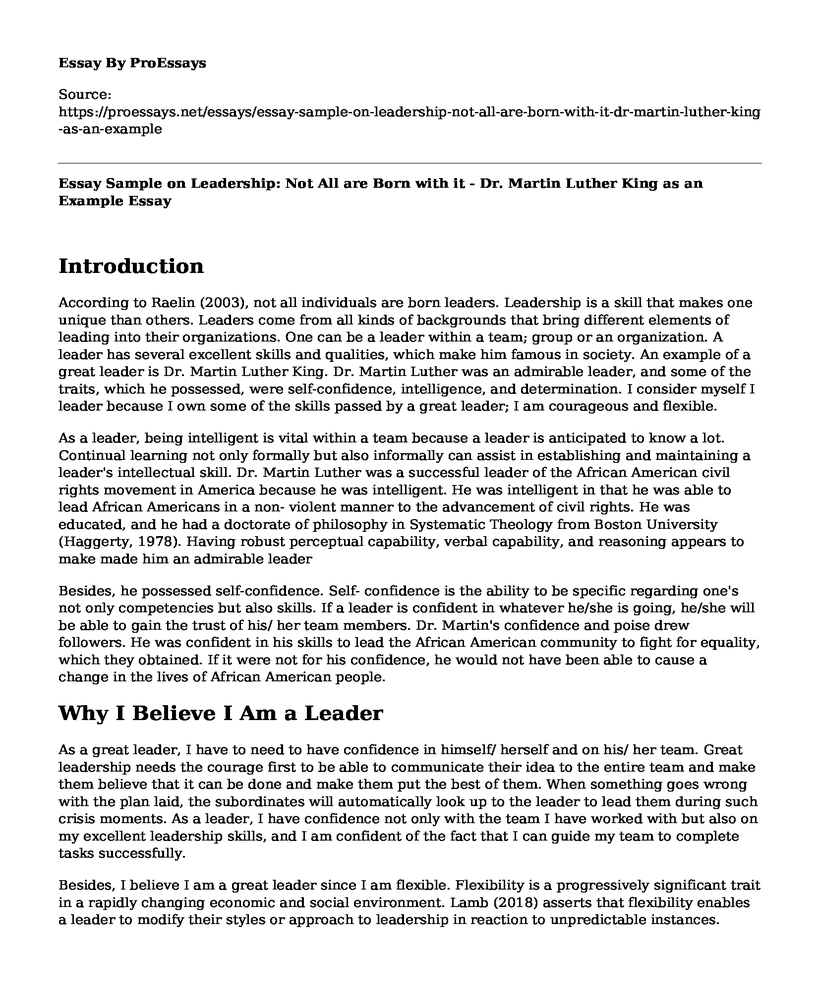Introduction
According to Raelin (2003), not all individuals are born leaders. Leadership is a skill that makes one unique than others. Leaders come from all kinds of backgrounds that bring different elements of leading into their organizations. One can be a leader within a team; group or an organization. A leader has several excellent skills and qualities, which make him famous in society. An example of a great leader is Dr. Martin Luther King. Dr. Martin Luther was an admirable leader, and some of the traits, which he possessed, were self-confidence, intelligence, and determination. I consider myself I leader because I own some of the skills passed by a great leader; I am courageous and flexible.
As a leader, being intelligent is vital within a team because a leader is anticipated to know a lot. Continual learning not only formally but also informally can assist in establishing and maintaining a leader's intellectual skill. Dr. Martin Luther was a successful leader of the African American civil rights movement in America because he was intelligent. He was intelligent in that he was able to lead African Americans in a non- violent manner to the advancement of civil rights. He was educated, and he had a doctorate of philosophy in Systematic Theology from Boston University (Haggerty, 1978). Having robust perceptual capability, verbal capability, and reasoning appears to make made him an admirable leader
Besides, he possessed self-confidence. Self- confidence is the ability to be specific regarding one's not only competencies but also skills. If a leader is confident in whatever he/she is going, he/she will be able to gain the trust of his/ her team members. Dr. Martin's confidence and poise drew followers. He was confident in his skills to lead the African American community to fight for equality, which they obtained. If it were not for his confidence, he would not have been able to cause a change in the lives of African American people.
Why I Believe I Am a Leader
As a great leader, I have to need to have confidence in himself/ herself and on his/ her team. Great leadership needs the courage first to be able to communicate their idea to the entire team and make them believe that it can be done and make them put the best of them. When something goes wrong with the plan laid, the subordinates will automatically look up to the leader to lead them during such crisis moments. As a leader, I have confidence not only with the team I have worked with but also on my excellent leadership skills, and I am confident of the fact that I can guide my team to complete tasks successfully.
Besides, I believe I am a great leader since I am flexible. Flexibility is a progressively significant trait in a rapidly changing economic and social environment. Lamb (2018) asserts that flexibility enables a leader to modify their styles or approach to leadership in reaction to unpredictable instances. Moreover, flexible leaders can adapt to changes as they come. They can change their plans to add innovations and overcome challenges, although still attaining their goals. Flexibility is not concerning surviving and flourishing in new circumstances. Malleable leaders can implement further actions into old, prevailing conditions. This permits them to express creativity in their work and find a new approach to solve problems.
Conclusion
Even though not everyone is born to be a leader, one can still use their strong and admirable skills to make a difference within their environment. One cannot completely lack a trait that can help them to be effective leaders. Dr. Martin Luther used his strong skills to enhance the lives of the African American population and come out as one of the best leaders whose acts are remembered and recognized in the modern world, yet he is live.
References
Haggerty, B. A. (1978). Martin Luther King, Jr.: Role Model for Religious Educators. Religious education, 73(1), 60-68. Retrieved from: https://doi.org/10.1080/0034408780730108
Lamb, D. J. (2018). Examining psychological flexibility at the individual, team, and leadership levels in crisis resolution teams (Doctoral dissertation, UCL (University College London)). Retrieved from: https://discovery.ucl.ac.uk/id/eprint/10043365/
Raelin, J. A. (2003). The myth of charismatic leaders. T+ D, 57(3). Retrieved from: https://papers.ssrn.com/sol3/papers.cfm?abstract_id=3354118
Cite this page
Essay Sample on Leadership: Not All are Born with it - Dr. Martin Luther King as an Example. (2023, Mar 27). Retrieved from https://proessays.net/essays/essay-sample-on-leadership-not-all-are-born-with-it-dr-martin-luther-king-as-an-example
If you are the original author of this essay and no longer wish to have it published on the ProEssays website, please click below to request its removal:
- The Importance of Groups to Christian Leadership Essay
- Vetements Ltee Case Study Paper Example
- Dual Identity and Whistleblowing Essay Example
- Essay Sample on Human Resource Management: Incentive Compensation Strategy
- Essay Sample on Organizational Systems and Structures Evaluation
- Project Management Case Study
- Essay Example on Corporate Governance: Key to IT Firm Success in Competitive World







